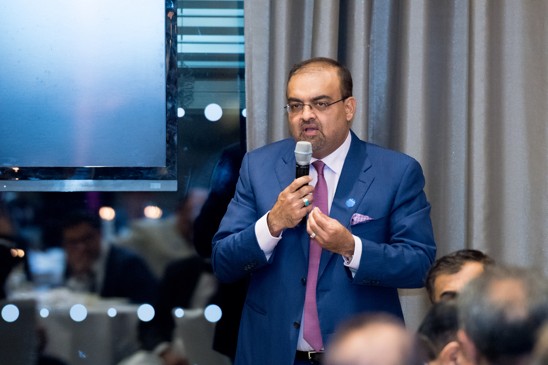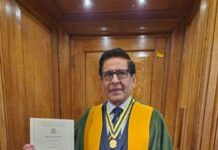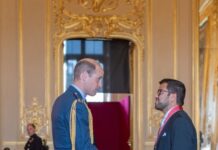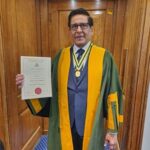Q&A with Sibtein Asaria
WF Executive Councillor for Eradication of Khoja Poverty, and Chairman of The World Federation Foundation Fund
Sibtein, you recently raised $1.2m in barely a month for HBT, which offers interest-free small business loans and established the Khoja CodeGirls program in Karachi. How did you do it?
Raising for HBT was special as the idea of helping our Khoja brethren was close to my heart. We first committed to this noble cause four years ago through our Asaria Family Foundation and saw the progress with how much good work Haydari Benevolent Trust (HBT) was doing on the ground, with proven examples of men and women starting businesses and economically uplifting their families and community.
At the historic Khoja Business Leaders’ Summit in Davos in September 2017 attendees agreed to tackle Khoja eradication of poverty along with education for all as the main initiatives that we converged on by signing the Davos Accord.
The next step was in October 2018 when we visited an HBT board meeting and nine philanthropists agreed to professionalize HBT, moving it from a volunteer model by committing to fund five years of administration-related costs to the tune of $80,000 per year. To ensure that HBT would run like a professional organization we adopted a governance structure with proper accountability and transparency. Then we debated on the Khoja Leadership Forum (KLF) group, got buy-in and agreed to do a fundraising campaign which would galvanize worldwide support for this cause …
That’s when we agreed in tandem that we would fundraise $12,000 from 100 philanthropists worldwide from Singapore to Pakistan to Africa to Europe to Canada to USA, basically covering all regions so that we would create the awareness to tackle this cause collectively on a global platform. Alhamdullillah with a lot of work, commitment and blessings we raised $1.2 million from 100 donors worldwide in less than 5 weeks.
Khoja Leadership Forum (KLF) – is it a rich man’s club?
KLF is not a rich man’s club! However it is a high achievers’ club. It is a group of individuals who excel in their fields, be it business, professional careers, lawyers, doctors, Nasa astronaut instructors, architects, sports, social and community workers. The fundraising for HBT is just one example of what it can do for the Khoja community. Before KLF, in my capacity as the ambassador of the Jaffari Community Centre (JCC) in Toronto, Canada, I spearheaded an international fundraising campaign and raised $22 million from many members of the worldwide Khoja community. Today the JCC, a mammoth project valued at $45 million, stands tall as a beacon of knowledge and spirituality for over 6,000 congregants in Toronto and the suburbs.
Can you tell us more about the CodeGirls program?
Yes, our Asaria Family Foundation, along with Jaffer Family Foundation and Al Haj Mustafa Bhai Kassam’s Foundation, in collaboration with Shamim Rajani of Genetech Solutions, established the CodeGirls Khoja program in Karachi to empower girls with skills in IT. Shamim is a female entrepreneur who is spearheading CodeGirls worldwide, starting with Pakistan. We implemented it with Khoja girls in Karachi, supporting a pilot project which involves two courses of coding for 4 months each, and a specially designed handholding period of 4 months to prepare them to join the workforce. After a year they would be earning $500 a month from the comfort of their home. This is an absolute gamechanger for the young women in our Khoja communities worldwide as it would provide them with a way to help themselves and their families out of generational poverty. We have 51 Khoja young women in the program in Karachi and In Shaa Allah hope to emulate this program in our Khoja African communities later this year.
Why is philanthropy important to you?
I’ve been an active volunteer for my local Jamaats since my migration from Mozambique to Canada, then Costa Rica and on to my most recent home in Dubai, UAE. The art of giving was inculcated by my late maternal grandfather and my late mother, the guiding light of my family and the reason why we give so much time to helping others. I have been fundraising for community projects for over 12 years starting with JCC in Toronto. Volunteering for WF is an important part of this, alongside the Asaria Family Foundation and The Orphan Trust, a food-distribution charity we have created in Kerbala, Iraq, to provide deserving orphan families with their basic monthly food needs in a systematic, dignified and transparent manner: www.theorphantrust.org There is nothing more satisfying than helping people in need, whether through education, welfare, housing, helping someone go into business, empowering men and women or building mosques. It is a fine Khoja heritage and I am humbled and grateful to be a part of it.
As a Councillor for WF, what do you do?
I’ve been an elected WF Executive Councillor since 2011, and I recently took on the portfolio for Eradication of Khoja Poverty, which I believe is inextricably linked to education. I’m also the elected Chairman of The World Federation Foundation Fund (WFFF) because I’m passionate about the community’s organizations being run in a sustainable and strategic way. The Fund can strengthen The World Federation for decades to come. Alhamdullillah the WFFF has now reached over $5 million, providing good returns yearly to sustain WF’s global footprint of humanitarian aid. We hope to double the size of the fund in the next three years.
What has been your biggest challenge in philanthropy?
Bringing the Davos Summit to life as Chairman of the Organizing Committee. The summit was the realization of the “Davos Dream”, an idea that I and other dedicated community leaders had nurtured and cherished in our minds for seven years. We brought together 150 entrepreneurs, philanthropists and high achievers in many fields to change the way we as a community focus our “giving back” to make the world a better place. It could not have happened without the huge commitment of the organizing team, volunteers, donors and all attendees – incredible hard work over years, but so much worth it.
What achievement are you most proud of?
It’s not so much being proud of any achievement, it’s more that I’m thankful and humbled about my achievements. The Inaugural Khoja Davos Summit was a gamechanger, as it was built upon the Khoja goodness and the wonderful spirit of our Khoja community, and it created an open platform of engagement to cross pollinate ideas, to foster cooperation and pool resources, so that we can all converge and finally work together for a few common causes and leverage our collective philanthropic potential. For now, our focus is Khoja eradication of poverty and education for all.
What is your next project?
I’m just back from Africa on a 10-day mission to meet AFED and Jamaat leaders and see first-hand all the good work that is being done in Dar es Salaam, Arusha, Nairobi and Mombasa. We have been engaging with the leadership to see how we can work together to focus on raising the bar of education by concentrating on the quality of education rather than quantity, and by creating a matrix and a barometer of excellence in all our community schools. Our motivation is to produce future leaders and professionals in our community who excel and can take our community to greater heights. We are focusing on eradicating Khoja poverty in East Africa and worldwide in the next five years. For that we need to adopt proper methodology and governance structures similar to HBT’s model for small business interest-free loans which need to be repaid over 40 months to make the program sustainable.
We are also keen to start several women’s empowerment programs in the region such as CodeGirls and others, which would provide Khoja women with the skillset to move up the social ladder. We want to again galvanize our worldwide Khoja donor community to provide a helping hand to our Khoja brethren in need, forging a strong working relationship with WF / AFED and the local Jamaats to do so.














